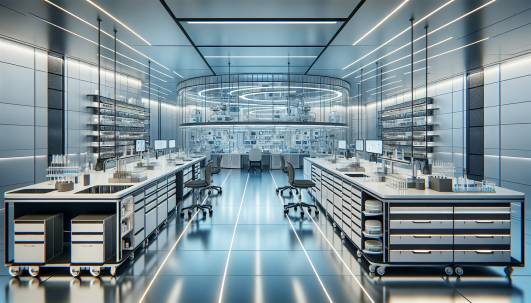The evolution of scientific research has necessitated advancements in laboratory design, moving away from rigid, specialized spaces towards more adaptable environments. Flexible laboratory spaces, characterized by their modularity, adaptability and multifunctionality, play a critical role in supporting modern scientific endeavors. These laboratories accommodate a wide range of research activities, promoting collaboration, innovation and efficiency.
Enhancing Collaboration and Interdisciplinary Research
One of the significant advantages of flexible laboratory spaces is their ability to promote collaboration and interdisciplinary research. Traditional laboratories often restrict scientists to specific areas of study due to their rigid design and specialized equipment. In contrast, flexible alternatives like co-working laboratory spaces feature modular components that can be easily reconfigured to support various research activities. This adaptability allows scientists from different disciplines to work together seamlessly, facilitating the exchange of ideas and methodologies. Interdisciplinary research is increasingly important in tackling complex scientific challenges, such as climate change, disease outbreaks and technological innovations. A dynamic and collaborative environment in flexible laboratories encourages the cross-pollination of ideas and techniques, leading to more comprehensive and innovative solutions.
Adapting to Rapid Technological Advances
The pace of technological advancement in scientific research is accelerating, with new tools and methodologies continually emerging. Flexible laboratory spaces are designed to adapt quickly to these changes, allowing laboratories to stay at the forefront of scientific innovation. Traditional laboratories, with their fixed infrastructure, often struggle to incorporate new technologies without significant disruptions and costly renovations. Flexible laboratories incorporate movable benches, modular casework and adaptable utilities, which can be easily reconfigured to integrate new equipment and technologies. This adaptability reduces downtime and confirms researchers have access to the latest tools, enhancing the overall quality and efficiency of their work.

Supporting Diverse Research Needs
Scientific research encompasses a wide array of disciplines, each with unique requirements in terms of space, equipment and environmental conditions. Flexible laboratory spaces cater to these diverse needs, providing a versatile environment that can be customized to support various types of research. For instance, a single flexible laboratory might be used for chemical synthesis one week and biological research the next, simply by reconfiguring the space and adjusting the environmental controls. This versatility is particularly beneficial in academic and research institutions where multiple projects often run concurrently. Maximizing the utility of available space, flexible laboratories enable institutions to support a broader range of research activities without the need for additional infrastructure.
Improving Efficiency and Cost-Effectiveness
Efficiency and cost-effectiveness are critical considerations in the design and operation of research laboratories. Flexible laboratory spaces contribute to these goals in several ways. The modular nature of these laboratories means they can be built and expanded incrementally, allowing institutions to scale their facilities in line with their research needs and funding availability. Additionally, the ability to quickly reconfigure laboratory spaces minimizes downtime and the costs associated with traditional renovations. This efficiency translates into more time spent on actual research and less on logistical and administrative tasks. Furthermore, flexible laboratories often incorporate energy-efficient designs and systems, reducing operational costs and environmental impact.
Enhancing Safety and Compliance
Safety is a paramount concern in any laboratory setting. Flexible laboratory spaces are designed with safety in mind, incorporating features that enhance the well-being of researchers and confirm compliance with regulatory standards. The modular design allows for the easy integration of safety equipment, such as fume hoods, emergency showers and eyewash stations in locations that best meet the needs of the research being conducted. The ability to reconfigure spaces means laboratories can be quickly adapted to meet changing safety regulations and protocols, guaranteeing ongoing compliance. This adaptability is particularly important in fields such as biomedicine and chemistry, where regulatory requirements are stringent and subject to frequent updates.
Fostering Innovation and Agility
The dynamic nature of scientific research demands an environment that fosters innovation and agility. Flexible laboratory spaces provide a platform for experimentation and creativity, allowing researchers to explore new ideas and approaches without the constraints imposed by traditional laboratory designs. This freedom to innovate is crucial in advancing scientific knowledge and developing new technologies. The agility offered by flexible laboratories enables researchers to respond quickly to emerging scientific opportunities and challenges. Whether pivoting to investigate a sudden disease outbreak or exploring a new line of inquiry, the ability to swiftly reconfigure laboratory spaces confirms research can proceed without delay.
Conclusion
Flexible laboratory spaces represent a significant advancement in the design and operation of research facilities. These laboratories are well-equipped to meet the demands of modern scientific research; as science continues to evolve, the importance of flexible laboratory spaces will only grow, guaranteeing researchers have the environments they need to drive discovery and innovation.